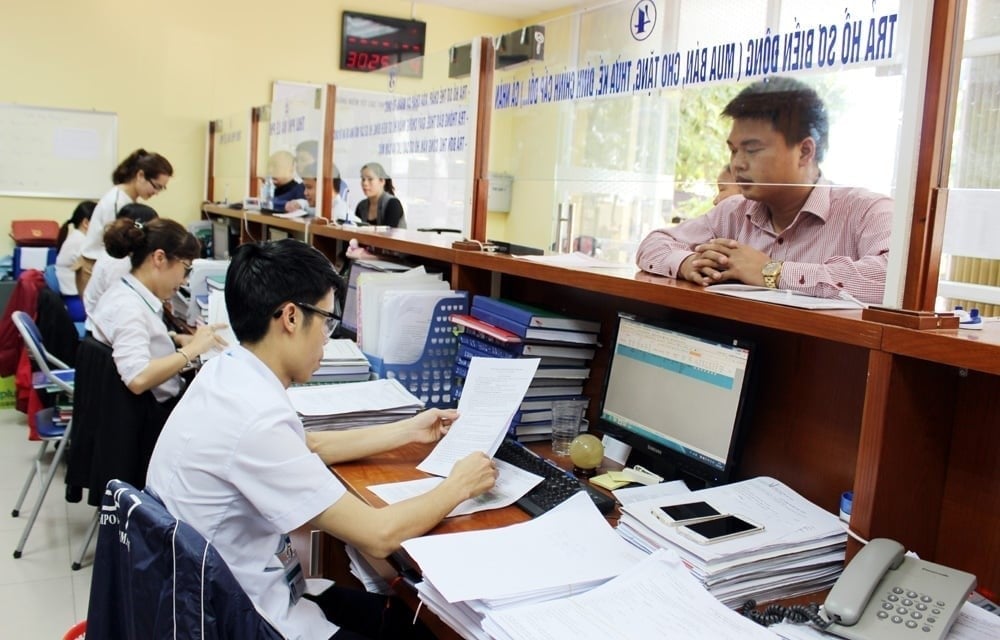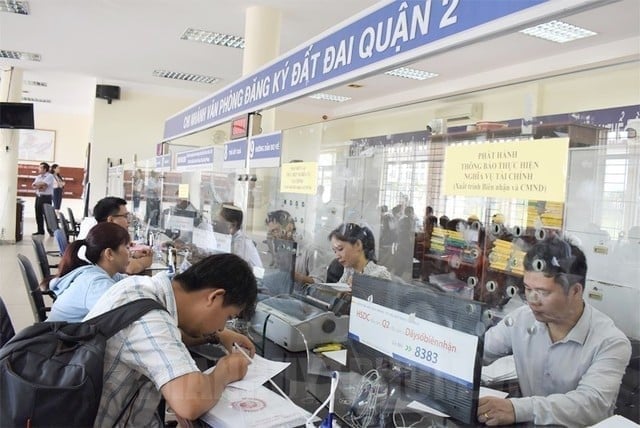December 30, 2025 | 22:27 GMT +7
December 30, 2025 | 22:27 GMT +7
Hotline: 0913.378.918
December 30, 2025 | 22:27 GMT +7
Hotline: 0913.378.918
Throughout 80 years of formation and development, Vietnam's land management sector has accompanied the nation's historical journey, associated with the resistance for independence, national construction, and defense. From fragmented and dispersed land management in the past, the legal system on land is now increasingly complete, affirming that land is the property of the people, with the State acting as the representative owner and exercising unified management.

The consolidation of the Land Registration Office has unified the management of cadastral records, thereby enhancing the effectiveness and efficiency of state land management. Photo: BL.
Important milestones such as the Land Law of 1987, 1993, 2003, 2013, and most recently the Land Law of 2024 have gradually established a coherent and modern legal corridor, aligned with the country's progress of Doi Moi (Renewal) and international integration. In addition, key resolutions of the Central Committee, particularly Resolution No. 19-NQ/TW (2012) and Resolution No. 18-NQ/TW (2022), have set requirements for strong reforms in land management in the direction of transparency, efficiency, and responsiveness to development demands.
One of the most important turning points has been the consolidation of the Land Registration Office system. Previously, the model of decentralized district-level Land Use Rights Registration Offices, as stipulated in the 2003 Land Law, revealed many limitations. Since the 2013 Land Law, further reinforced by the 2024 Land Law, the single-tier Land Registration Office under the Department of Natural Resources and Environment has been established. This represents a major step forward, overcoming fragmentation while laying the foundation for modernizing the land management sector in line with the process of national digital transformation.
Implementing Resolution No. 19-NQ/TW (2012), Resolution No. 18-NQ/TW (2022), and the provisions of the 2013 and 2024 Land Laws, the Ministry of Natural Resources and Environment (now the Ministry of Agriculture and Environment) has issued multiple directives guiding localities to consolidate their Land Registration Offices. As of July 1, 2025, all 63 centrally governed provinces and cities have completed the consolidation according to the single-tier model.
The consolidation of Land Registration Offices has unified the management of cadastral records, thereby strengthening the effectiveness and efficiency of state land management and gradually creating the premise for the development of a national land database. This system is ready to provide land information to agencies, organizations, the people, and businesses. At the same time, the model helps ensure transparency in the real estate market, clearly separates state management from public service delivery, and clarifies the responsibilities of each agency in handling administrative procedures.
Administrative reforms in the land sector have also been accelerated, with more standardized, interconnected, and efficient procedures for handling applications. In practice, the Land Registration Offices have become focal points promoting administrative reform, fostering the development of e-government while enabling more flexible coordination of human resources across units.
Outstanding results include the decrease in the number of procedures for the registration and issuance of Certificates of Land Use Rights, Ownership of Houses, and Assets Attached to Land from 48 to 30, with processing time shortened by 27.84%. The rate of resolving land transaction applications at local levels has reached 90–95% of the required standard. To date, more than 44 million cadastral records have been established nationwide, over 30 million records updated and revised, and approximately 30 million electronic cadastral books brought under management.
In addition, many administrative procedures for registration and certificate issuance have been implemented online through the National Public Service Portal and the public service portals of provinces and cities.
Alongside the achievements, certain limitations remain. In some localities, administrative procedures are still complicated and prolonged, cadastral databases remain inconsistent, high-quality human resources are in short supply, and overlapping management causes inconvenience for people and businesses.

The consolidation of Land Registration Offices stands as clear evidence of determination to build a modern, transparent land governance system that serves the people and contributes to transforming land into a truly vital resource for socio-economic development. Photo: TN.
Many solutions have been put forward to enhance management efficiency. Specifically, continuing to streamline organizational structures while improving the quality of personnel; accelerating the application of information technology and the digitization of records; carrying out thorough, public, transparent administrative reforms; strengthening inspection, supervision, and enforcement against violations; and intensifying public communication of land laws so that the people better understand their rights and obligations in land management and use.
The consolidation of Land Registration Offices is clear evidence of the determination to build a modern, transparent land governance system that serves the people and contributes to transforming land into a truly vital resource for socio-economic development.
Deputy Minister of Agriculture and Environment Le Minh Ngan emphasized that Land Registration Offices serve as the "extended arm" of the State in land management, directly serving the people and businesses while helping the State firmly grasp and effectively manage the national land fund.
Translated by Thu Huyen
/2025/12/29/0829-2-000508_274.jpg)
(VAN) Hai Phong is tightening management, with 100% of fishing vessels licensed and equipped with vessel monitoring systems, joining the national effort to lift the EC's 'yellow card.'
/2025/12/27/2744-1-121716_241.jpg)
(VAN) The Viet Nam Environment Protection Fund is the national environment protection fund and a state financial institution under the Ministry of Agriculture and Environment.
/2025/12/27/2015-2-111213_813.jpg)
(VAN) In efforts to realize the goal of Net Zero emissions, reducing urban emissions is regarded as a key solution.

(VAN) Deputy Prime Minister Tran Hong Ha requested to design the EPR mechanism toward a circular economy that is transparent, feasible, and non-administrative and aligned with actual recycling capacity.

(VAN) On December 24, Deputy Prime Minister Tran Hong Ha chaired a meeting about approving greenhouse gas emission quotas for 2025 - 2026 period.

(VAN) As Viet Nam enters a new era, the national agricultural sector must proactively adapt to global trends to transform current challenges into strategic development opportunities.
/2025/12/18/5046-3-154320_307.jpg)
(VAN) Granting planting area codes is a solution that helps Lao Cai manage forests effectively while also laying a data foundation to support the development of the carbon credit market in the future.